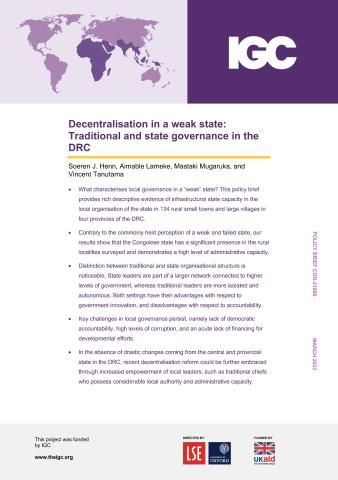-
Henn et al Policy brief March 2023
PDF document • 572.72 KB
- What characterises local governance in a “weak” state? This policy brief provides rich descriptive evidence of infrastructural state capacity in the local organisation of the state in 134 rural small towns and large villages in four provinces of the DRC.
- Contrary to the commonly held perception of a weak and failed state, our results show that the Congolese state has a significant presence in the rural localities surveyed and demonstrates a high level of administrative capacity.
- Distinction between traditional and state organisational structure is noticeable. State leaders are part of a larger network connected to higher levels of government, whereas traditional leaders are more isolated and autonomous. Both settings have their advantages with respect to government innovation, and disadvantages with respect to accountability.
- Key challenges in local governance persist, namely lack of democratic accountability, high levels of corruption, and an acute lack of financing for developmental efforts.
- In the absence of drastic changes coming from the central and provincial state in the DRC, recent decentralisation reform could be further embraced through increased empowerment of local leaders, such as traditional chiefs who possess considerable local authority and administrative capacity.


